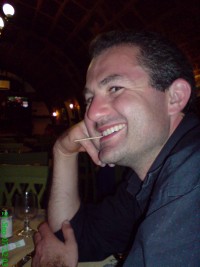Individualist anarchism is the branch of anarchism that emphasize the individual and their will over external determinants such as groups, society, traditions and ideological systems. Although usually contrasted to social anarchism, both individualist and social anarchism have influenced each other. Mutualism, an economic theory particularly influential within individualist anarchism whose pursued liberty has been called the synthesis of communism and property, has been considered sometimes part of individualist anarchism and other times part of social anarchism. Many anarcho-communists regard themselves as radical individualists, seeing anarcho-communism as the best social system for the realization of individual freedom.

Johann Kaspar Schmidt, better known as Max Stirner, was a German philosopher who is often seen as one of the forerunners of nihilism, existentialism, psychoanalytic theory, postmodernism and individualist anarchism. Stirner's main work The Ego and Its Own was first published in 1845 in Leipzig and has since appeared in numerous editions and translations.
The Ego and Its Own is an 1844 work by German philosopher Max Stirner. It presents a radically nominalist and individualist critique of Christianity, nationalism, and traditional morality on one hand; and on the other, humanism, utilitarianism, liberalism, and much of the then-burgeoning socialist movement, advocating instead an amoral egoism. It is considered a major influence on the development of anarchism, existentialism, nihilism, and postmodernism.
History of Materialism and Critique of Its Present Importance is a philosophical work by Friedrich Albert Lange, originally written in German and published in October 1865. Lange vastly extended the second edition published in two volumes in 1873–75. A three-volume English translation of the opus was published 1877–81.

The Essence of Christianity is a book by Ludwig Feuerbach first published in 1841. It explains Feuerbach's philosophy and critique of religion.

Saul Newman is a British political theorist and central post-anarchist thinker.
Sidney Parker, also known as S. E. Parker, was a British egoist and a former individualist anarchist who wrote articles and edited several journals from 1963-1993. Notably Parker wrote the introductions to the books Might is Right and The Ego and Its Own by Max Stirner.
Hans Günter Helms was a German experimental writer, composer, and social and economic analyst and critic.

The philosophy of Max Stirner is credited as a major influence in the development of individualism, nihilism, existentialism, post-modernism and anarchism. Max Stirner's main philosophical work was The Ego and Its Own, also known as The Ego and His Own. Stirner's philosophy has been cited as an influence on both his contemporaries, most notably Karl Marx as well as subsequent thinkers such as Friedrich Nietzsche, Enrico Arrigoni, Steven T. Byington, Benjamin Tucker, Émile Armand, Albert Camus and Saul Newman.

Der Eigene was the first gay journal in the world, published from 1896 to 1932 by Adolf Brand in Berlin. Brand contributed many poems and articles; other contributors included writers Benedict Friedlaender, Hanns Heinz Ewers, Erich Mühsam, Kurt Hiller, Ernst Burchard, John Henry Mackay, Theodor Lessing, Klaus Mann, and Thomas Mann, as well as artists Wilhelm von Gloeden, Fidus, and Sascha Schneider. The journal may have had an average of around 1500 subscribers per issue during its run, but the exact numbers are uncertain.

The ideas of 19th-century German philosophers Max Stirner and Friedrich Nietzsche have often been compared and many authors have discussed apparent similarities in their writings, sometimes raising the question of influences. In Germany, during the early years of Nietzsche's emergence as a well-known figure the only thinker discussed in connection with his ideas more often than Stirner was Arthur Schopenhauer. It is certain that Nietzsche read about Stirner's book The Ego and Its Own, which was mentioned in Friedrich Albert Lange's History of Materialism and Critique of its Present Importance (1866) and Eduard von Hartmann's Philosophy of the Unconscious (1869), both of which young Nietzsche knew very well. However, there is no irrefutable indication that he actually read it as no mention of Stirner is known to exist anywhere in Nietzsche's publications, papers or correspondence.

Egoist anarchism or anarcho-egoism, often shortened as simply egoism, is a school of anarchist thought that originated in the philosophy of Max Stirner, a 19th-century existentialist philosopher whose "name appears with familiar regularity in historically orientated surveys of anarchist thought as one of the earliest and best known exponents of individualist anarchism".
Individualist anarchism in Europe proceeded from the roots laid by William Godwin, Individualist anarchism expanded and diversified through Europe, incorporating influences from American individualist anarchism. Individualist anarchism refers to several traditions of thought within the anarchist movement that emphasize the individual and his or her will over external determinants such as groups, society, traditions, and ideological systems.
The relation between anarchism and Friedrich Nietzsche has been ambiguous. Even though Nietzsche criticized anarchism, his thought proved influential for many thinkers within what can be characterized as the anarchist movement. As such "[t]here were many things that drew anarchists to Nietzsche: his hatred of the state; his disgust for the mindless social behavior of 'herds'; his anti-Christianity; his distrust of the effect of both the market and the State on cultural production; his desire for an 'übermensch'—that is, for a new human who was to be neither master nor slave".

Eumeswil is a 1977 novel by the German author Ernst Jünger. The narrative is set in an undatable post-apocalyptic world, somewhere in present-day Morocco. It follows the inner and outer life of Manuel Venator, a historian in the city-state of Eumeswil who also holds a part-time job in the night bar of Eumeswil's ruling tyrant, the Condor. The book was published in English in 1993, translated by Joachim Neugroschel.
Der Einzige is the title of a German egoist anarchist magazine, which appeared in 1919, as a weekly, then sporadically until 1925. It was edited by Anselm Ruest, and co-edited, in the first year, by Mynona, who was his uncle. Its title was adopted from the book Der Einzige und sein Eigentum by Max Stirner. Another influence was the thought of German philosopher Friedrich Nietzsche. The publication was connected to the local expressionist artistic current and the transition from it towards dada.
German individualist philosopher Max Stirner became an important early influence in anarchism. Afterwards Johann Most became an important anarchist propagandist in both Germany and in the United States. In the late 19th century and early 20th century there appeared individualist anarchists influenced by Stirner such as John Henry Mackay, Adolf Brand and Anselm Ruest and Mynona.

Ludwig Andreas von Feuerbach was a German philosopher and anthropologist best known for his book The Essence of Christianity, which provided a critique of Christianity that strongly influenced generations of later thinkers, including Charles Darwin, Karl Marx, Sigmund Freud, Friedrich Engels, Richard Wagner, and Friedrich Nietzsche.
Property is theft! is a slogan coined by French anarchist Pierre-Joseph Proudhon in his 1840 book What is Property? Or, an Inquiry into the Principle of Right and of Government.
If I were asked to answer the following question: What is slavery? and I should answer in one word, It is murder!, my meaning would be understood at once. No extended argument would be required to show that the power to remove a man's mind, will, and personality, is the power of life and death, and that it makes a man a slave. It is murder. Why, then, to this other question: What is property? may I not likewise answer, It is robbery!, without the certainty of being misunderstood; the second proposition being no other than a transformation of the first?
Anarchism is the political philosophy which holds ruling classes and the state to be undesirable, unnecessary and harmful, or alternatively as opposing authority and hierarchical organization in the conduct of human relations.












